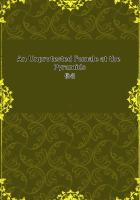It is possible for the premisses of the syllogism to be true, or to be false, or to be the one true, the other false. The conclusion is either true or false necessarily. From true premisses it is not possible to draw a false conclusion, but a true conclusion may be drawn from false premisses, true however only in respect to the fact, not to the reason. The reason cannot be established from false premisses: why this is so will be explained in the sequel.
First then that it is not possible to draw a false conclusion from true premisses, is made clear by this consideration. If it is necessary that B should be when A is, it is necessary that A should not be when B is not. If then A is true, B must be true: otherwise it will turn out that the same thing both is and is not at the same time. But this is impossible. Let it not, because A is laid down as a single term, be supposed that it is possible, when a single fact is given, that something should necessarily result. For that is not possible. For what results necessarily is the conclusion, and the means by which this comes about are at the least three terms, and two relations of subject and predicate or premisses. If then it is true that A belongs to all that to which B belongs, and that B belongs to all that to which C belongs, it is necessary that A should belong to all that to which C belongs, and this cannot be false: for then the same thing will belong and not belong at the same time. So A is posited as one thing, being two premisses taken together. The same holds good of negative syllogisms: it is not possible to prove a false conclusion from true premisses.
But from what is false a true conclusion may be drawn, whether both the premisses are false or only one, provided that this is not either of the premisses indifferently, if it is taken as wholly false: but if the premiss is not taken as wholly false, it does not matter which of the two is false. (1) Let A belong to the whole of C, but to none of the Bs, neither let B belong to C. This is possible, e.g. animal belongs to no stone, nor stone to any man. If then A is taken to belong to all B and B to all C, A will belong to all C; consequently though both the premisses are false the conclusion is true: for every man is an animal. Similarly with the negative. For it is possible that neither A nor B should belong to any C, although A belongs to all B, e.g. if the same terms are taken and man is put as middle: for neither animal nor man belongs to any stone, but animal belongs to every man. Consequently if one term is taken to belong to none of that to which it does belong, and the other term is taken to belong to all of that to which it does not belong, though both the premisses are false the conclusion will be true. (2) A similar proof may be given if each premiss is partially false.
(3) But if one only of the premisses is false, when the first premiss is wholly false, e.g. AB, the conclusion will not be true, but if the premiss BC is wholly false, a true conclusion will be possible.
I mean by 'wholly false' the contrary of the truth, e.g. if what belongs to none is assumed to belong to all, or if what belongs to all is assumed to belong to none. Let A belong to no B, and B to all C. If then the premiss BC which I take is true, and the premiss AB is wholly false, viz. that A belongs to all B, it is impossible that the conclusion should be true: for A belonged to none of the Cs, since A belonged to nothing to which B belonged, and B belonged to all C.
Similarly there cannot be a true conclusion if A belongs to all B, and B to all C, but while the true premiss BC is assumed, the wholly false premiss AB is also assumed, viz. that A belongs to nothing to which B belongs: here the conclusion must be false. For A will belong to all C, since A belongs to everything to which B belongs, and B to all C.
It is clear then that when the first premiss is wholly false, whether affirmative or negative, and the other premiss is true, the conclusion cannot be true.
(4) But if the premiss is not wholly false, a true conclusion is possible. For if A belongs to all C and to some B, and if B belongs to all C, e.g. animal to every swan and to some white thing, and white to every swan, then if we take as premisses that A belongs to all B, and B to all C, A will belong to all C truly: for every swan is an animal. Similarly if the statement AB is negative. For it is possible that A should belong to some B and to no C, and that B should belong to all C, e.g. animal to some white thing, but to no snow, and white to all snow. If then one should assume that A belongs to no B, and B to all C, then will belong to no C.
(5) But if the premiss AB, which is assumed, is wholly true, and the premiss BC is wholly false, a true syllogism will be possible: for nothing prevents A belonging to all B and to all C, though B belongs to no C, e.g. these being species of the same genus which are not subordinate one to the other: for animal belongs both to horse and to man, but horse to no man. If then it is assumed that A belongs to all B and B to all C, the conclusion will be true, although the premiss BC is wholly false. Similarly if the premiss AB is negative.















